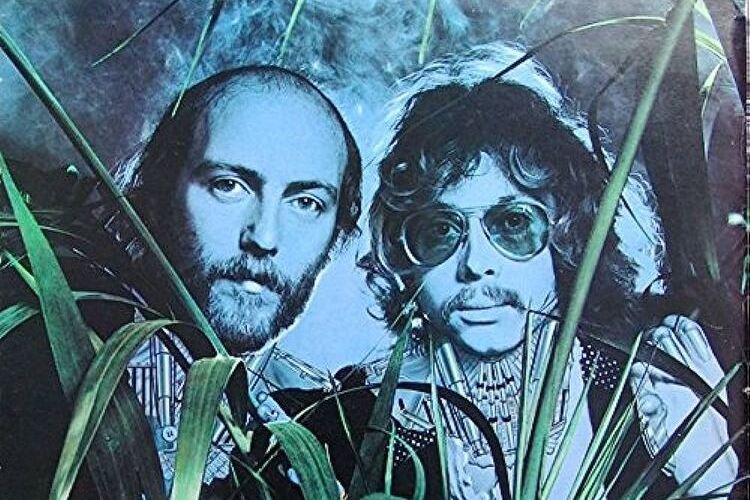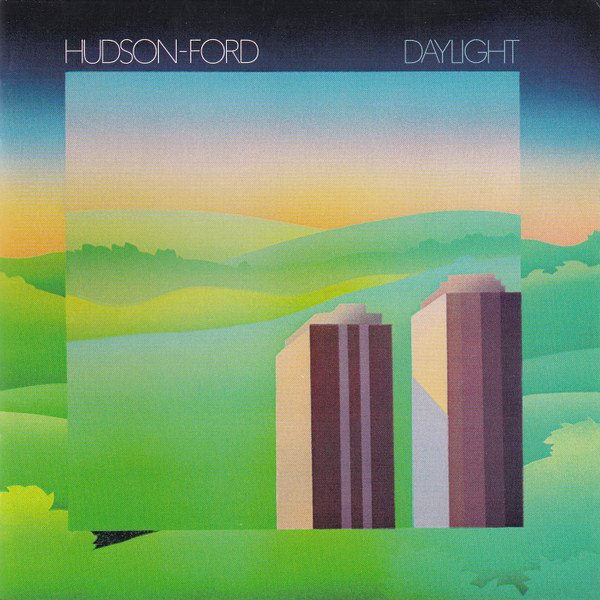CATALOG CRAWL: HUDSON-FORD (1973-1977)
If you're a Strawbs fan, you've heard the work of Richard Hudson and John Ford. Starting with Just A Collection Of Antiques and Curios and continuing through Bursting At The Seams, they played a vital role in making the Strawbs into a successful progressive rock outfit with their songwriting, vocals and instrumental contributions. Unfortunately, their creative union with Strawbs leader Dave Cousins was a combustible one and they left after a 1973 U.S. tour, striking out as a duo for a brief but successful tenure that yielded four albums.
The career choice made sense as singer-songwriter duos were a common fixture of the popular music scene in the '70s... but it's worth noting that Hudson-Ford offered a unique take on this format that brought in elements of subgenres you wouldn't associate with it: you'll find progressive rock in spots and a few bracing hard rock excursions amid the pop and soft rock, as well as a touch of everything from English music hall to disco. The Hudson-Ford catalog is great fun to explore if your '70s music tastes roam in a variety of directions and this Catalog Crawl is designed to give you an idea of the many winding paths it offers.
Members: Richard Hudson (vocals, guitars), John Ford (vocals, bass), Chris Parren (keyboards), Mickey Keen (guitars 1973-1974), Gerry Conway (drums 1973-1974), Ken Laws (drums 1974-1977)
NICKELODEON (1973): The duo's debut is pleasant, colorfully arranged singer-songwriter pop in the vein of Stealer's Wheel. The hit was "Pick Up The Pieces," a slinky bit of country rock with a hooky chorus and a hypnotic slide guitar hook. It has an earthy, rustic quality yet also boasts a crystal-clear, carefully layered production courtesy of Strawbs vet Tom Allom, a duality that defines the album's contents as Hudson and Ford tackle everything from funk-infused rock ("Crying Blues") to quaint music hall whimsy ("Hello, I Thought You Were Dead") to delicate orchestrated pop ("I Wanted You"). There's also a psychedelic hangover on tunes like "Angels" and the ambitious, sci-fi-themed closer "Revelations," a pleasing quality enhanced by the duo's often Beatle-esque vocal harmonies. The end result feels like a Strawbs album from this era, only with prog replaced by pop, less angst and the duo's radio-friendly vocals replacing Dave Cousins' edgy rasp. Trivia note: the orchestral arrangements were handled by Del Newman, who fulfilled the same role on Elton John's Goodbye Yellow Brick Road album from the same year.
FREE SPIRIT (1974): this is the closest Hudson-Ford ever got to doing a prog rock album. For example, "Silent Star" is an eight minute art-rock epic, very Strawbs-ian in how it divides its time between song sections with vocal harmonies and showy yet disciplined instrumental breaks, and songs like "Take A Little Word" and "I Don't Want To Be A Star" are rockers arranged like suites with surprise bridges and extended solos. Such material is balanced by singer-songwriter pop experimentation in the first album's style: the title track is a richly-harmonized bit of country rock, "Such A Day" spices up harmony-driven psych pop with some Wishbone Ash-style twin guitar breaks and "How Many Times" is good-time rock in a '50s vein, complete with a saxophone section. The result has a more unified "band" feel than its predecessor, with a set lineup of players unifying the sound with their energetic playing. On that note, Parren's keyboard work is rich and spectacular throughout the album, full of grandly pompous analog synth lines and sumptuous layers of mellotron.
WORLDS COLLIDE (1975): album three splits the difference between the first two, returning to the genre-hopping and singer-songwriter approach of Nickelodeon but keeping the flashier arrangements and band-driven musical coherence of Free Spirit, albeit with less overtures to prog rock. Memorable rockers here include "Worlds Collide," which pumps up its sound with synths and a horn section, and "Bootleg," which offsets its tough, riff-driven verses with an ethereal pomp-rock chorus. There's also a component of silky soft rock here: "When Love Has Overgrown" is the album's best song, with an elegant Beatle-esque melody given lavish harmonies and orchestration, and "Day Without Love" is a midtempo charmer with a smoothly harmonized chorus and a jazzy electric piano break. Other highlights include the religious mysticism of "Jesus Said," which boasts a cinematic arrangement full of shifts in dynamics, and "Keep Me Rollin'," whose acoustic uptempo approach harbors a constantly-twisting chorus hook. The result doesn't break new ground but delivers a bit of everything in a 'big production' style likely to charm fans of '70s pop rock lavishness.
DAYLIGHT (1977): Hudson and Ford faced a lot of changes on their final album: a new label, producers chosen by management, session musicians rather than their own band and a directive to achieve a sound in keeping with current trends. The result has a radically revised musical approach, with progressive elements thrown out and rock toned down to a more an orchestrated pop palette. If you can handle those changes, it offers skillfully crafted enjoyment of a different kind: songs like "Out Of Your Shadow" and "Shy Girl" incorporate disco elements while "Kiss In The Dark" and "Let It Rain" have a flowery, classical element to their keyboards and layering of strings and horns. Highlights include "Are You Dancing?," an amusing send-up of mating rituals on the dance floor, and "Wicked Lady," which creates an odd, gothic mood with its tolling bells and Spanish guitars. Robin Geoffrey Cable handled most of the production, creating a plush and luxurious soundscape, and the Rupert Holmes/Jeffrey Lesser team crafted the slinky soft rock of "95 In The Shade."






